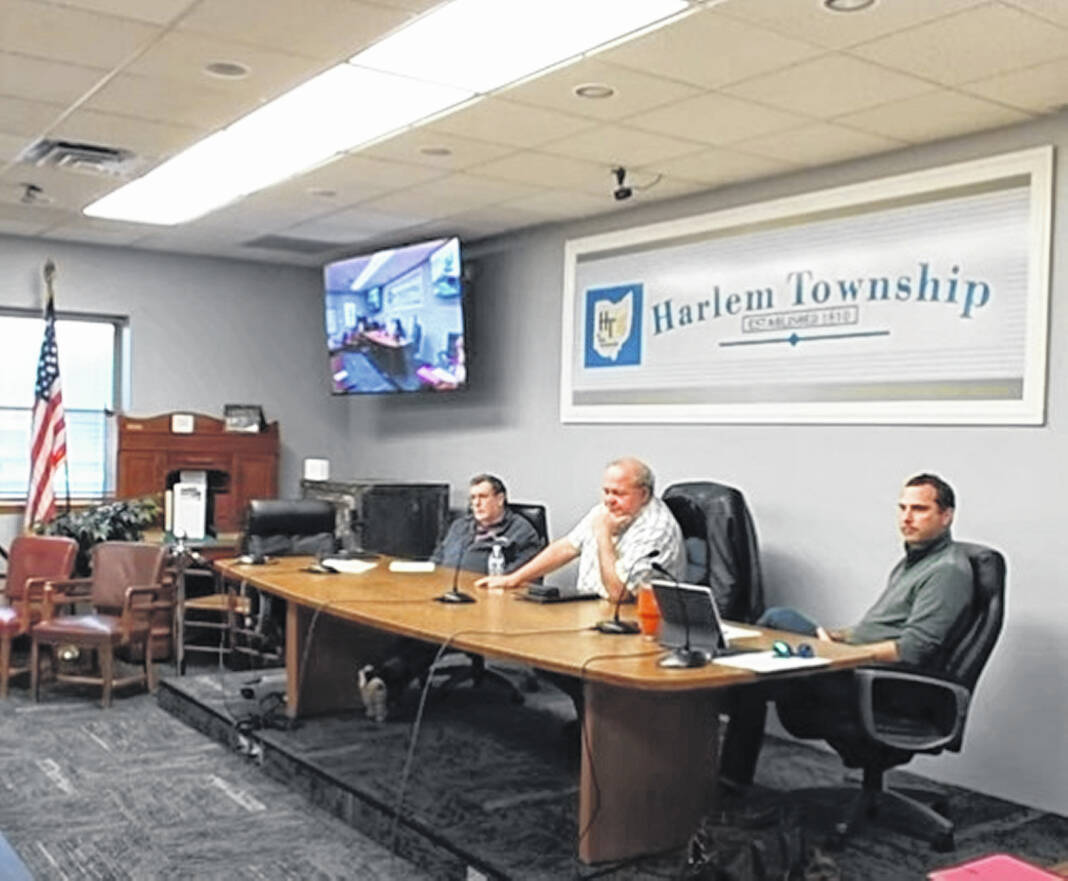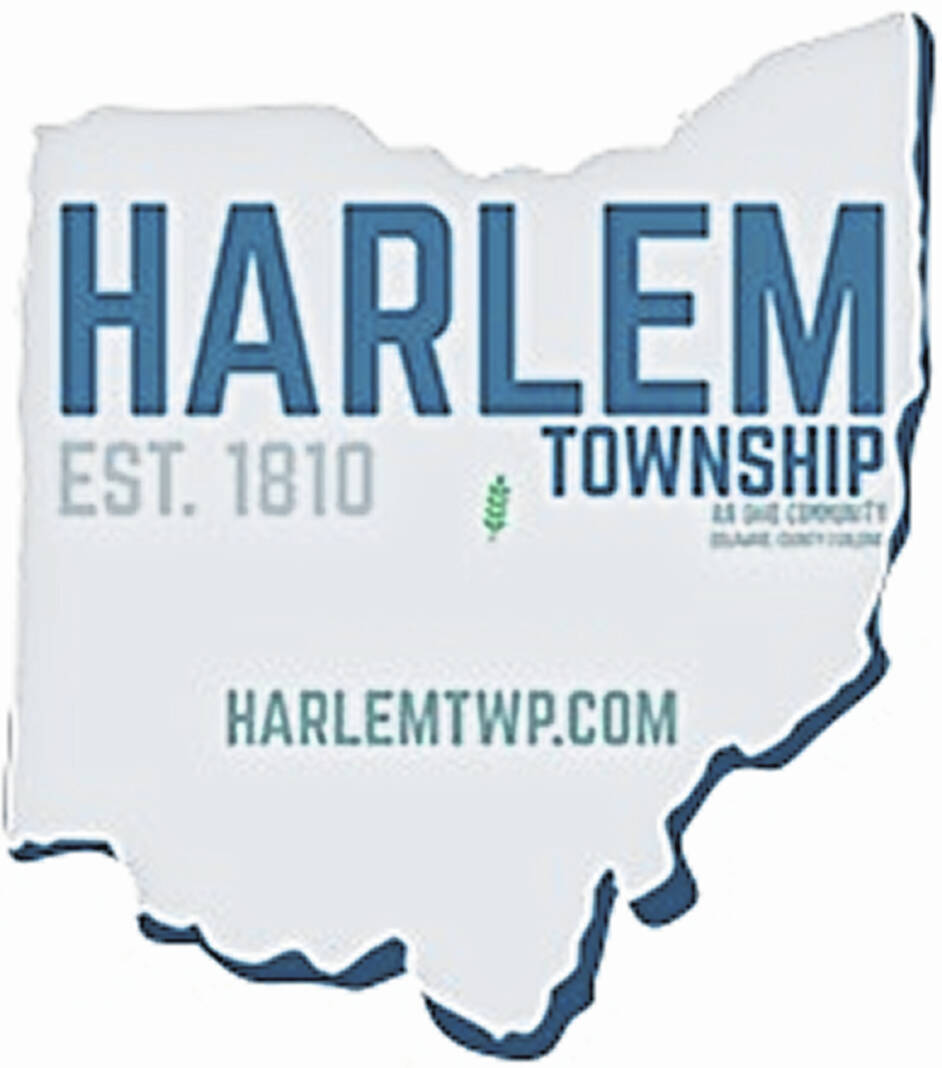
Harlem Township trustees (left to right) David Jackson, Carl Richison and Matt Jaeger listen to public comments during their meeting on March 25.
Courtesy | screenshot

GALENA — The Harlem Township Board of Trustees meetings of March 20 and March 25 were largely devoted to the proposed merger with the City of Westerville, with the result being to continue looking at options for a community concerned with encroachment from Intel and neighboring cities.
At that first meeting, many residents let their feelings be known about the prospect of a merger and had plenty of questions and comments over the course of that hours-long meeting. Some had no idea that Harlem was looking into a merger, others didn’t like Westerville as a merger partner, and some felt there was no difference between a merger and an annexation. Others said they didn’t want Westerville’s amenities or pay increased taxes on them. Some said they felt Westerville would absorb and dissolve Harlem.
There was also discussion about the services offered by Del-Co Water and the Delaware County Sewer District, with representatives from each utility present.
In addition, members of the township’s Strategic Planning Committee asked the trustees if they would accept the year-plus work these resident-volunteers had put into their recommendations, which led to the merger proposal.
The trustees — David Jackson, Matt Jaeger and Carl Richison — said they would. However, Jaeger also said he felt more time was needed to understand what would be involved in the merger.
The trustees reconvened on March 25 for nearly 2.5 hours. Again, there were tense exchanges between the trustees and the public, calling for transparency and considering Westerville only as a last resort.
“Do you care about this community?” Jaeger said to the residents after one heated back-and-forth. “We’re all talking, but nobody’s listening. We need to listen to each other without raising voices. We’re all in this together. I’m begging the community, don’t get ripped apart … A dialogue is important.”
When it came to public comment, the first person thought there was agreement “to take the foot off the gas in the rush” to do the merger. Richison said we’re not moving forward to get on the November ballot, but they were still having discussions “with them (Westerville) and everyone else,” including parallel options. Westerville is aware of this, he said, but is moving forward with their own legislative process, which differs from Harlem’s.
“We’re not committed,” Richison said. “I’ve tried to reiterate that since day one. … I understand this came out of nowhere. … We decided to back off, we slowed it down. … We could not say something until that first reading took place.”
Former Trustee Jerry Paul said a Westerville-based firm is advertising the merger, and he was told there is nothing to advertise. It was said Westerville City Council had its second reading on the merger. Paul asked that six Harlem officials (the trustees, and members from zoning and the BZA) and three residents be represented in open session when it comes to consulting with the other planners. He’d like a consultant to help the township and then hire a full-time resident planner.
A resident asked if the township could use a planner that Westerville isn’t using so it can be unbiased? Harlem trustees said two planning firms had been recommended, and they would find at least one more. He said he wanted to get a township planner two years ago.
“I know some people don’t think it’s an issue, but I just watched land get annexed on our northern border, and they’re voting to turn it into an industrial park,” Richison said. It was later said this was about 300 acres from Vans Valley Road to Trenton from Trenton Township by the City of Sunbury. This would be one lot north of Harlem.
Townships aren’t informed of annexations until they happen, it was said.
A citizen asked which residents would be meeting with the officials and planners. Richison said no matter who the trustees pick, people will be upset with their choice. He was also concerned that filling a church with 300 people may yield 300 different opinions. It was then further suggested by a resident that there be a criterion for selecting the three firms. Paul said he could help with that, although he is retired from the board.
Another resident said she keeps asking, why can’t we just stay Harlem Township?
“I would love to,” Richison said. “But I keep waiting for someone to come in here with that magic wand and show me how we have the power to do that. The township’s powers are very limited — zoning, which we’ve tried to put in place, and public referendum. Right now, there’s legislation trying to take that away (at the state level). The problem is, if a large landowner or any landowner decides that they want to annex into to whoever, we as a township will not know it’s happening because they don’t have to communicate with us. That’s the law. The property owners are the one that do the annexation.”
“We started with the overlay process,” Jackson said, referring to zoning.
Jaeger added that a planner could see if there were other tools available to the township. Some residents suggested not holding any further meetings until a planner was hired.
“We’re all in a turmoil over this Westerville thing,” said a resident. “We’re all in a turmoil with each other. It’s not going to stop. Let’s start over.”
Another resident asked if the township could form another committee separate from the SPC to pursue other avenues using all the governmental tools at the county or association level at their disposal. Jaeger said he was working with the Ohio Township Association, and Richison said the SPC has been working on multiple parallel paths. A resident said other communities have kept their autonomy, and the trustees weren’t using Harlem’s citizenry to help them. Richison said he’s asked for two years for such help.
“We need to make sure this keeps moving,” Richison said. He said that builders, developers, and other communities often request that negotiations not be made public. Further, if there isn’t a quorum of officials such as trustees, it’s not considered a public meeting, and notes aren’t taken.”
“Where are you trying to take this?” Richison was asked. “The way we see it, we’re being myopically guided to a Westerville-tracked merger. Help us to understand what is happening in parallel. We want to help, but we’re not willing to jump on the Westerville train.”
“You guys stonewall anybody with anything. You don’t give out any information,” another person said. “So how do you expect the community to go along with anything you’re telling us?”
“I’ve done nothing but try to help this community,” Richison said. “I am not covering anything up! Are you listening? If there’s a non-disclosure meeting, we cannot disclose that information.”
Jim Steelesmith of the SPC said developers often have plans for a property that they don’t want other developers to know about, hence the non-disclosure agreements. “If you violate that, no one’s going to talk to us,” Steelesmith said.
Another resident said that based on the prior meeting, the utility providers’ presentation gave the impression that annexation from Columbus wasn’t as imminent as first thought. However, Harlem officials said they would need to vet any claims from the suppliers. There were also concerns about the ability of Westerville to supply water to Harlem.
New Albany-based developer Joe Ciminello then spoke, saying a 350-acre reservoir in Harlem (north of Center Village) would solve a lot of the water issues. Ciminello proposed a public-private partnership utilizing Tax Increment Financing (TIF), Joint Economic Development Districts (JEDD) and New Community Authorities (NCA) as funding mechanisms. He said that together they could keep Harlem “rural-centric,” but that growth was going to come, and it was inevitable. Ciminello cited development he had done in Grove City. He was concerned that Harlem’s actions were being driven by fear, and that 4,500 acres out of 17,000 acres in the southern portion of the township could be developed.
“You want to concrete the world,” Ciminello was told by a resident. “We want Harlem to stay Harlem. Leave us alone.”
Richison, who also sits on the SPC, invited Ciminello to present his plan at a future SPC meeting. “The plan needs to be planned with the community,” Ciminello said. “I sense great potential.”
“Good old New Albany is going to gobble us up,” said a resident. “Do we really need that many homes? Do we need that much clutter?”
Steve Eisenbrown of the SPC said when Westerville proposed the merger idea to them, “we about fell out of our chairs. But they explained how it works, we started doing research, and at the same time, we’re still talking with other people. … The law says we can back out anytime.” He said they had approached Westerville as the municipality administering the JEDD.
Earlier in the meeting, SPC member Molly Snodgrass said three people volunteered to be on the SPC following March 20. It was recommended that a monthly newsletter be mailed out to better communicate with the residents, she said. It would be similar to the annual newsletter, only more regular, with the option to use email for those who prefer it. A resident said they didn’t want the SPC leading the communications, as they felt they did a poor job relating information about the merger, and that taxpayer money was involved. A liaison team would work with the trustees and the volunteers, led by Jaeger. This was approved by the trustees.
“There are residents who want to know what an agreement looks like,” Snodgrass said of the Westerville merger.
Richison said there would be more educational meetings set up for the public to understand the avenues the township is pursuing.
“I’m not necessarily for it, but I want more information,” he recalled someone telling him at the grocery store.
In other business, three culverts on Trenton Road will be evaluated for replacement. There was also a problem with Zoom, staff said — it was recording, but it was not taking calls.
The SPC meeting scheduled for April 2 was canceled due to the weather.
Assistant Editor Gary Budzak photographs and reports on stories in eastern Delaware County and surrounding areas.

